Related Research Articles
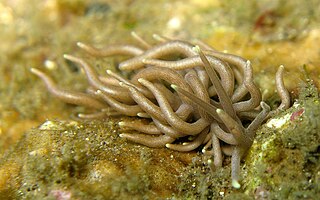
Phyllodesmium briareum is a species of sea slug, an aeolid nudibranch, a marine gastropod mollusc in the family Facelinidae.

The Facelinidae are a taxonomic family of colorful sea slugs. These are specifically aeolid nudibranchs. They are marine gastropod molluscs.

Phyllodesmium is a genus of predatory sea slugs, aeolid nudibranchs, marine gastropod molluscs in the family Facelinidae.
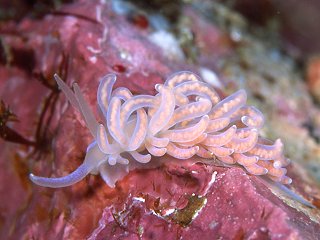
Phyllodesmium serratum is a species of sea slug, an aeolid nudibranch, a marine gastropod mollusc in the family Facelinidae.

Phyllodesmium longicirrum, common name the solar-powered phyllodesmium, is a species of sea slug, an aeolid nudibranch, a marine gastropod mollusc in the family Facelinidae.
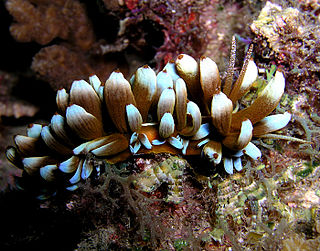
Phyllodesmium kabiranum is a species of sea slug, an aeolid nudibranch, a marine gastropod mollusc in the family Facelinidae.

Phyllodesmium crypticum is a species of sea slug, an aeolid nudibranch, a marine gastropod mollusc in the family Facelinidae.
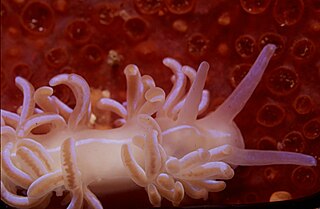
Phyllodesmium horridum, the coral nudibranch, is a species of sea slug, specifically an aeolid nudibranch. It is a marine gastropod mollusc in the family Facelinidae.

Phyllodesmium rudmani is a species of sea slug, an aeolid nudibranch, a marine gastropod mollusc in the family Facelinidae.

Phyllodesmium colemani is a species of sea slug, an aeolid nudibranch, a marine gastropod mollusc in the family Facelinidae.
Phyllodesmium guamense is a species of sea slug, an aeolid nudibranch, a marine gastropod mollusc in the family Facelinidae.
Phyllodesmium hyalinum is a species of sea slug, an aeolid nudibranch, a marine gastropod mollusc in the family Facelinidae.

Phyllodesmium iriomotense is a species of sea slug, an aeolid nudibranch, a marine gastropod mollusc in the family Facelinidae.
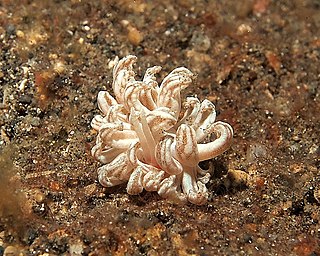
Phyllodesmium jakobsenae is a species of sea slug, an aolid nudibranch, a marine gastropod mollusk in the family Facelinidae.

Phyllodesmium macphersonae is a species of sea slug, an aeolid nudibranch, a marine gastropod mollusc in the family Facelinidae.

Phyllodesmium magnum is a species of sea slug, an aeolid nudibranch, a marine gastropod mollusc in the family Facelinidae.

Phyllodesmium opalescens is a species of sea slug, an aeolid nudibranch, a marine gastropod mollusc in the family Facelinidae.
Phyllodesmium parangatum is a species of sea slug, an aeolid nudibranch, a marine gastropod mollusc in the family Facelinidae.
Phyllodesmium pecten is a species of sea slug, an aeolid nudibranch, a marine gastropod mollusc in the family Facelinidae.
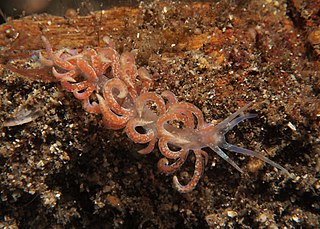
Phyllodesmium poindimiei is an Alcyonacea feeding, aeolid nudibranch Gastropod belonging to the family Facelinidae. Cerata are important in this clade in terms of their physical defense and efficient metabolic processes.This species is spread sporadically along tropical coastal regions such as Australia, Hawaii, and the Indo-Pacific living in diverse marine habitats such as coral reefs. Unlike other species in the Opisthobranch Mollusca clade, P. poindimiei’s lush pink cerata are used for defensive purposes other than Nematocyst (dinoflagellate) capture and toxin release. Organismal ties within these thriving, tropical ecosystems can be determinants of environment change, which affects massive coral ecosystems. Continuously changing marine ecosystems, such as coral reefs, are directly linked to the evolution of organisms that live and thrive in the tropics such as the soft nudibrach P. poindimiei.
References
- 1 2 Millen, S. V. and J. C. Hamann. (1992) A new genus and species of Facelinidae (Opisthobranchia, Aeolidacea) from the Caribbean Sea. The Veliger 35(3): 205-214.
- ↑ Rosenberg, G. (2015). Pauleo jubatus Millen & Hamann, 1992. In: MolluscaBase (2015). Accessed through: World Register of Marine Species on 2015-12-25
- ↑ Rudman, W.B., 1999 (August 24) Pauleo jubatus Millen & Hamann, 1992. [In] Sea Slug Forum. Australian Museum, Sydney.